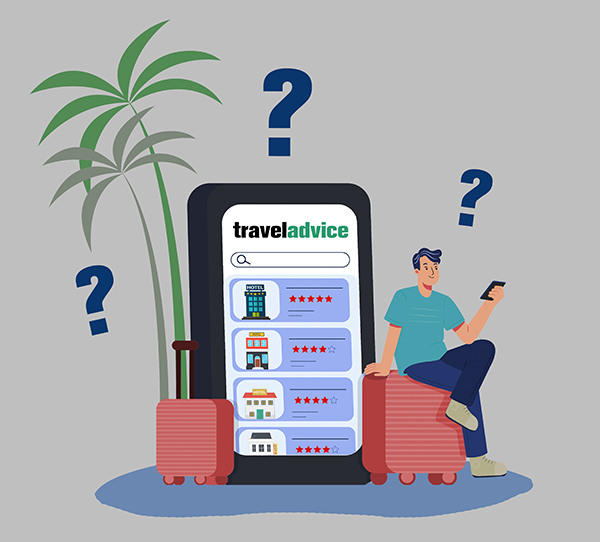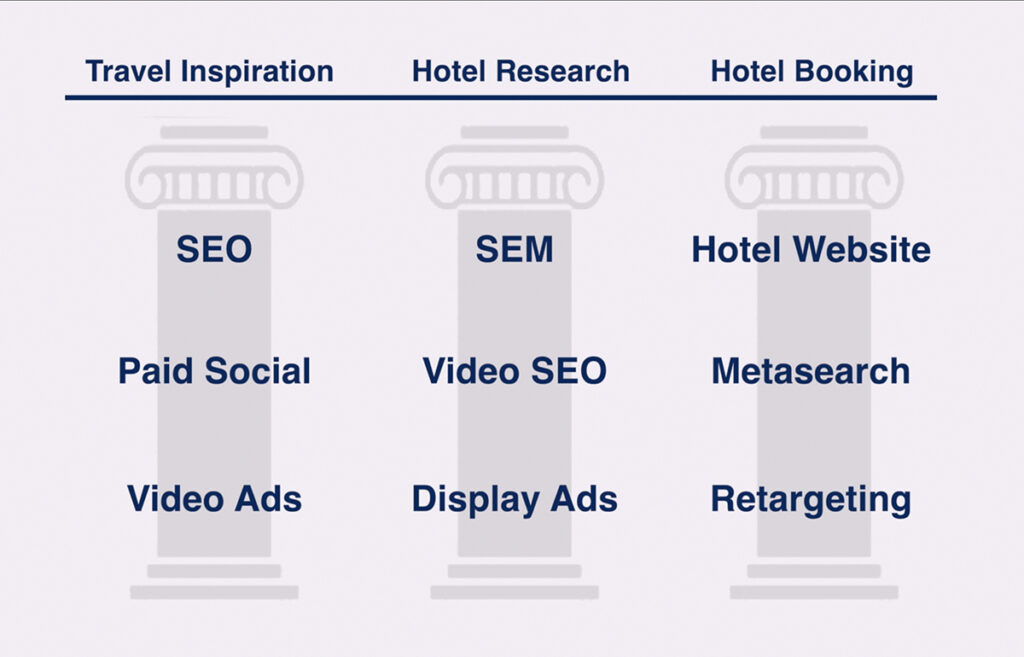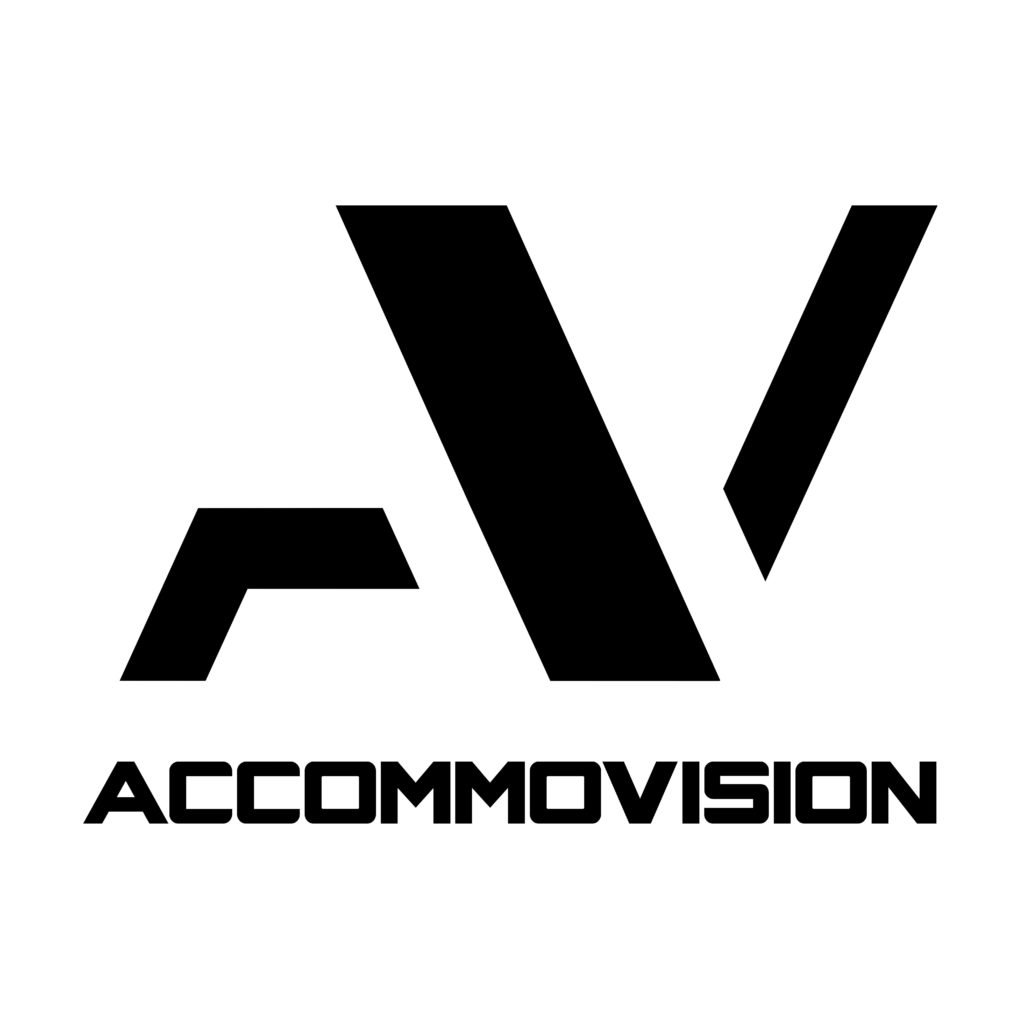4 MINUTE READ
Here, we’ll explore how this innovative approach empowers hotel marketers to captivate and convert their guests by understanding the fundamental principles of the hotel booking journey.
First principles thinking is an approach to problem-solving that involves breaking down complex issues into their fundamental truths or basic principles. It relies on logical reasoning and encourages us to question our assumptions to arrive at new and original solutions. It’s been a powerful tool used by many great thinkers and innovators to challenge conventional wisdom and explore new possibilities.
Understanding the Hotel Booking Journey
In today’s hotel marketing environment, it’s common for hotels of all sizes to hire digital marketing agencies to promote their accommodations online. These agencies typically employ various tactics, such a search engine optimization, search engine marketing, display advertising, and the occasional video ad on platforms like YouTube and Facebook. However, many of the marketing strategies that these agencies employ are simply based on what most other people are doing, rather than being rooted in a well-thought-out methodology focused on understanding the average traveler’s online behavior.
In many cases, these digital marketing agencies simply chase around the newest, trendiest, most popular social platforms of the day while ignoring some fundamental aspects of your marketing strategy, like your hotel’s website or your YouTube channel. Rather than focusing all of your attention on the latest online platforms, it’s important to build your marketing strategy on a fundamental understanding of the hotel booking journey. Understanding the average traveler’s booking experience is key to building a marketing strategy that is evergreen and able to adapt to any change in the consumer environment.
Travel Inspiration Phase
A good way to take a first principles approach to the hotel booking journey is by creating a typical customer persona or avatar, someone who is preparing for a trip and would likely end up staying at a hotel like yours. For example, let’s meet a young couple planning their second honeymoon. They’re searching for the perfect destination near their home city and want to learn more before committing to a trip. They turn to their favorite Internet browser and start researching. They begin by searching for “things to do in Savannah, Georgia” to gather information about their destination.
During the travel inspiration phase, our couple browses websites, reads articles, and even watches YouTube videos showcasing the beauty and attractions of their chosen destination. Over the next few weeks, they gradually learn more about the destination and get a better idea of what they want to experience. These initial moments of inspiration are crucial for capturing their attention early and sparking their interest in your hotel.
Hotel Research Phase
At this point, a typical traveler will begin looking at different pricing options to get a decent idea of the average market rate for a hotel room in the area. During the research phase, they turn to search engines, OTA’s, and metasearch engines to compare prices and availability. This typically involves search websites like Google or Bing, OTA’s like Expedia or Booking.com, and metasearch engines like Kayak, Trivago, and others. This phase is where hotels can stand out by offering competitive rates and appealing promotions, along with the occasional well-placed display ad.
After comparing across a variety of search engines and websites, most travelers narrow down their hotel choices to just a handful within their price range.
Hotel Booking Phase
Next, they do a deep dive, spending more time looking at things like hotel websites and reviews to make sure they’re making the best choice for their money. This is a critical opportunity for hotels to make a lasting impression. By providing a visually captivating website experience, with rich media and engaging videos, hotels can showcase the unique features and amenities they offer and encourage direct bookings.
Finally, once our travelers find a price they are happy with, they book a room through their chosen platform and receive confirmation from the hotel itself.
Throughout their booking journey, different travelers may choose different platforms to gather information about their travel destinations and possible hotel accommodations. The important thing is to understand the general process involved in booking a hotel room overall, rather than the specific platforms that travelers visit to gather information or book their rooms in the end.
Conclusion
Broad internet usage trends change over time, and different generations tend to use different platforms to share social posts and information about their travel experiences and aspirations. By adopting a first principles approach and staying attuned to the evolving landscape of internet usage and social platforms, hotel marketers can continuously adapt their strategies to reach and engage travelers effectively.
By aligning your marketing efforts with the customer’s journey and ensuring that compelling and relevant content is available during these crucial moments, you can effectively capture the attention and interest of potential guests. When hotels succeed in providing the right information and experiences to travelers throughout their booking journey, the revenue growth naturally follows.
About Accommovision
We deliver results-driven imagery to ignite demand for hotels, resorts, and luxury properties. From breathtaking videos to targeted campaigns, we strategically empower you to captivate your audience and leave a lasting impression.
Our unique blend of creative prowess and technical proficiency ensures your visual content reaches travel customers at critical touchpoints along the booking journey – driving revenue growth to maximize your marketing investment. Elevate your image and stand out from the crowd.




